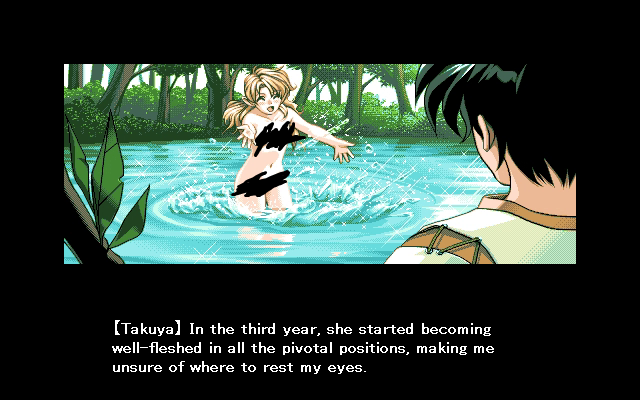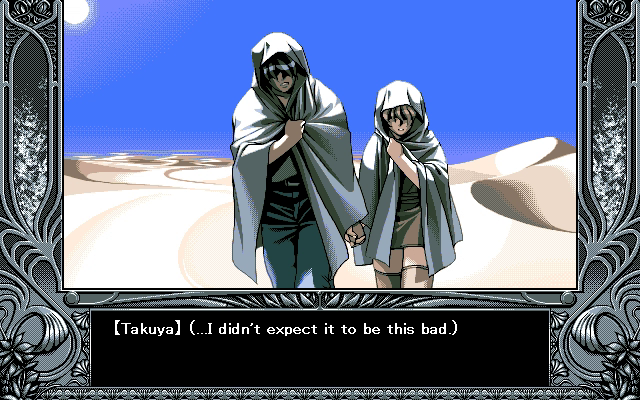At risk of a tangent, I wish to address a possible mischaracterization of one of my chief criticisms. A story depicting incest does not scandalize me. Nor does incest-themed pornography and fiction—I am “terminally online,” after all, and have watched several anime. In terms of a moment-to-moment description of its most lurid moments, YU-NO falls well short of the nastiest story I have encountered in video games or otherwise. Like, don’t condescend to me. But no other story in any medium has produced the degree of revulsion in me that YU-NO achieved—YU-NO, the first and only video game to make me physically ill multiple times (for reasons other than motion sickness). Perhaps, despite my bile and eye-rolling and, during my own playthrough, desperate reaching to justify carrying on or sympathizing with Takuya, that YU-NO leaves me nauseous, leaves my heart racing, is testament to its ability to, through music and artwork and how much the sheer tsunami of bullshit wears one down, invest players in its world. Pity that the investment is used for this.

Some readers might wonder why I am focusing all this attention on YU-NO when a variety of much, much more depraved and extreme eroge exist, or else assume that I must be ignorant of such things. The first reason is that I played YU-NO, thought it was a bad and disappointing story, and am expressing that. However, even when certain material seems strange or gross to me, I don’t judge people for what sexual fantasies appeal to them, though I also discourage no one from criticizing certain material or considering it reflects about the culture that it exists in. However, it seems strange to take extreme taboo smut “seriously” in the same way that we would a more (for lack of better terms) artistic, elevated narrative such as YU-NO. If YU-NO wants to be taken seriously as art, well, this is what happens when I take it seriously.
And also, YU-NO is special for its renown. Basically, I don’t consider it a worthwhile use of time to seek out every piece of especially egregious or misogynistic pornography that exists on the internet and then write some long breakdown.
Had I had stopped even fifty hours in, or if the credits abruptly rolled the moment Takuya landed in Dela Grante, I would have an overall positive impression of YU-NO. I would say the sleaziness is just a sign of its 1990s eroge culture and appreciate the ways in which it transcends these limitations. That slow transition from the Prologue to the Epilogue features a soothing atmosphere, scintillating music, gorgeous and erotic pixel art, moments of horror and tension, and lots of hot women and even more bare breasts (for each woman has two)—therein lies the appeal. Or so I would assume if reviewers praised the vibes instead of the story.
I would like to understand how those who did complete the Epilogue could discuss (much less recommend) YU-NO without even mentioning that it’s the tale of how fucking your own daughter you raise from infancy in-game saves the day. So too do I wonder how someone could be emotionally invested in a story and not leave such an ending at least disappointed—Sorlie even claims that the “emotional depth of the characters” makes “the result of their fates all the more intense,” the deep, intense emotions of disappointing resolutions, an awful main character who learns nothing, and sugary-sweet parental incest.

Were the objectionable content and padding stripped out of YU-NO, the story would still not be a masterpiece. The story would be fine, on par with an uneven anime. Scientists have experimentally proven this hypothesis with the 2019 YU-NO anime that does remove the incest and much of the sex (though, incredibly, adds a subplot involving homosexual rape). The anime is thoroughly adequate and nothing more, though its cheap, inferior art direction and pitiful attempts at reconstructing a few of the game CGs results in a worse moment-to-moment presentation that further undercuts the weak story. (The anime Takuya is not obsessed with fucking his mom. Kanno would be insulted.) Without the objectionable content and padding, the ADMS gameplay would be what it is: interesting as a concept but undercooked because hundreds of vulgar jokes are more important than interrogating the implications of the sci-fi scenario, which is nothing but a pretense.
There are a few stand-out moments scattered between hours of slog, such as the showdown with Ryuuzouji in the storehouse or the horror under Triangle Mountain, but even so this hypothetical YU-NO would be far from a revolutionary masterpiece. It would be, at most, what YU-NO is more than anything: a long adventure game with great graphics and a memorable world-hopping gimmick. It would be influential, perhaps, for its production values and structural complexity. But the rest of what the actual YU-NO is drags this adventure from decent to gross. And while it is true that many of these misogynistic tropes and lolicon-ish stuff are as commonplace in old Japanese computer games as racism is in old(er) European literature, this no more means that I should excuse YU-NO than Robinson Crusoe’s important place in the development of the English novel and sometimes impressive prose means I cannot recognize its comprehensive white supremacy.